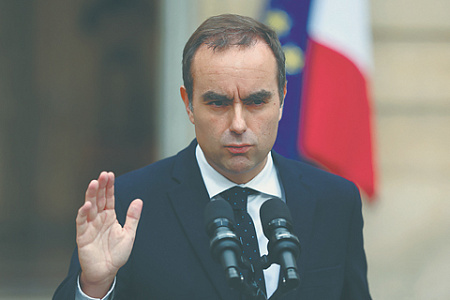
France is embroiled in its latest political crisis after Prime Minister Sébastien Lecornu resigned just 27 days into his tenure, marking him as the shortest-serving head of government in modern French history. His swift departure, occurring mere hours after a new cabinet was announced, underscores the nation’s profound parliamentary deadlock and the daunting challenge of fiscal austerity, leaving a deeply fractured political landscape in its wake.
The dramatic events unfolded on the morning of October 6th, plunging France into renewed political uncertainty. Appointed by President Emmanuel Macron on September 9th, Lecornu’s brief term was primarily tasked with forging a new national budget plan palatable to the deeply divided political factions – a feat his predecessor, François Bayrou, also failed to achieve. The composition of Lecornu’s cabinet, largely mirroring its forerunner, drew immediate and sharp criticism from the opposition, exacerbating an already tense environment.
The heart of the crisis lies in the government’s struggle to implement significant budget cuts aimed at reducing France’s soaring national debt, currently at 114% of its Gross Domestic Product. Bayrou’s attempt to force a confidence vote on proposed austerity measures, including freezing social benefits and abolishing two public holidays to boost defense spending, was met with fierce resistance from both the left and the far-right. This inability to find common ground on fiscal responsibility ultimately led to his resignation, a fate quickly replicated by Lecornu.
In explaining his decision, Mr. Lecornu stated, “The conditions necessary for me to carry out my duties as Prime Minister were not present.” He squarely condemned the “exorbitant party appetites” of parliamentary factions, characterizing them as an insurmountable obstacle to compromise on the critical budget issue, thereby rendering his position untenable.
President Macron now faces an extremely tight political bind. Already in his second and final term – barred from seeking re-election in 2027 by constitutional limits – his options appear severely constrained. A snap parliamentary election, which he previously dismissed, is a highly risky proposition. His decision to call early elections in 2024 proved costly, as his centrist coalition, ‘Ensemble pour la République,’ lost 86 seats and its majority. Polling suggests any new vote would yield even more detrimental results for his allies, pushing them further into a minority.
The opposition, emboldened by the government’s instability, is intensifying its calls for radical change. Jean-Luc Mélenchon, leader of the left-wing La France Insoumise (LFI) party, has publicly demanded a motion to remove President Macron from office. Mathilde Panot, head of LFI’s parliamentary group, echoed this sentiment on social media, declaring, “The countdown has begun. Macron must go.”
Similarly, the far-right National Rally, led by Marine Le Pen, is advocating for a dissolution of the lower house of parliament, a move she deems “absolutely necessary.” Current public opinion polls indicate significant popularity for her party, suggesting a snap election could benefit her political ambitions. Le Pen further suggested that it would be “wise” for Macron to resign from his post.
However, the prospect of Macron’s forced removal appears legally remote. Evgenia Obichkina, a Professor of International Relations and Foreign Policy at MGIMO, clarified that impeachment due to a loss of parliamentary confidence is not stipulated in the Fifth Republic’s Constitution. “The removal of a president from office is possible only in two cases: physical or mental incapacity, or high treason,” she explained. “Neither of these criteria applies to the current situation.”
Professor Obichkina anticipates that Macron will likely seek to consolidate support among centrist factions. “The formation of a new government will probably rely on Macronists and other central representatives with whom the head of state’s supporters can work,” she commented, emphasizing the need to “retain power and the instruments of political decision-making within the presidential team.” Yet, she cautioned, “one can expect any unexpected political combinations from Macron,” underscoring the unpredictable nature of French politics.
